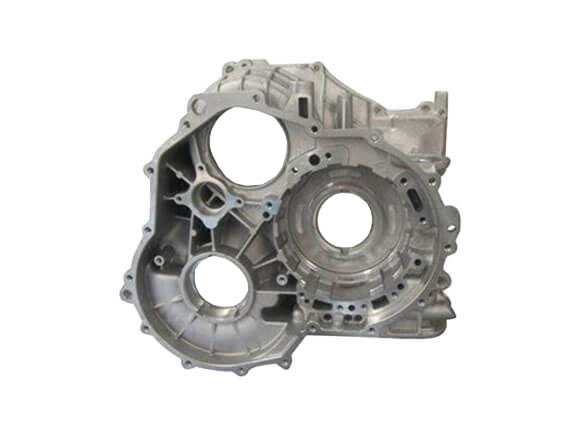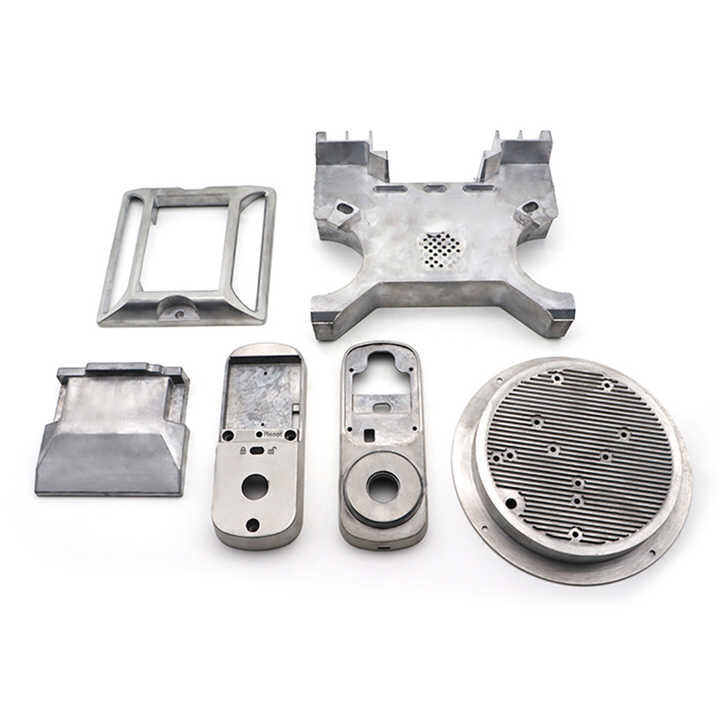How aluminum casting improves manufacturing efficiency
Exactly How Aluminum Spreading Contributes to Effective Manufacturing Solutions
Light weight aluminum spreading plays an important duty in modern manufacturing. Its lightweight nature and rust resistance make it a recommended choice for various sectors. Techniques such as die spreading and sand casting enable the development of elaborate get rid of very little waste. The combination of automation additional boosts production performance. Nevertheless, the ramifications of these advancements prolong beyond mere productivity. Understanding the broader influence discloses considerable understandings right into the future of manufacturing
The Benefits of Aluminum in Manufacturing
Although numerous steels are made use of in production, light weight aluminum attracts attention as a result of its special homes that boost production effectiveness and item efficiency. Its light-weight nature notably reduces transportation expenses and power requirements in numerous applications. Light weight aluminum's excellent deterioration resistance warranties long life and resilience, decreasing the need for constant replacements and maintenance. This steel can be quickly molded and shaped, enabling functional layout alternatives that meet particular market demands. Additionally, light weight aluminum exhibits superior thermal and electrical conductivity, making it an ideal choice for applications calling for efficient warmth dissipation and electrical management. The recyclability of aluminum additionally plays a crucial function in lasting manufacturing techniques, as it can be reused without losing its inherent buildings. Overall, the advantages of light weight aluminum in manufacturing bring about set you back financial savings, enhanced item long life, and a lowered environmental impact, making it a favored material in numerous sectors.
Secret Aluminum Casting Techniques
Light weight aluminum casting strategies are necessary for generating high-grade components in numerous producing processes. The key approaches consist of sand casting, pass away spreading, and financial investment casting. Sand spreading involves producing a mold and mildew from sand, which enables for complex forms and huge elements. This strategy is usually preferred for its cost-effectiveness and versatility. Pass away casting, on the other hand, makes use of high-pressure to infuse liquified aluminum right into steel molds, leading to accurate, uniform components ideal for high-volume manufacturing. Investment casting uses remarkable surface coating and intricate detail by making use of a wax pattern that is disappeared to develop the mold. Each of these methods has certain applications and benefits, permitting makers to select the most appropriate method based on factors like manufacturing intricacy, product, and volume requirements. By comprehending these crucial strategies, makers can boost their production efficiency and ensure the integrity of their aluminum parts.
Effect On Automotive Sector
As the automobile market increasingly prioritizes light-weight products to enhance gas efficiency and efficiency, light weight aluminum spreading has actually emerged as an important remedy. This production procedure enables automakers to generate intricate components with reduced weight without jeopardizing structural integrity. By using light weight aluminum spreading, suppliers can produce components such as engine blocks, transmission housings, and suspension parts that are not only lighter but additionally show exceptional thermal conductivity and deterioration resistance.
The convenience of aluminum spreading methods enables the production of complex styles, facilitating innovation in lorry appearances and functionality. As cars come to be more highly advanced, the capacity to incorporate attributes like innovative safety and security systems and electrical drivetrains becomes vital.

Aerospace Applications of Light Weight Aluminum Spreading
Light weight aluminum spreading plays a critical duty in aerospace applications by allowing the production of light-weight structural components that improve gas effectiveness. In addition, the precision of light weight aluminum spreading enables the development of elaborate engine parts, which are essential for peak efficiency and reliability. This mix of light-weight materials and exact design placements aluminum casting as a crucial innovation in the aerospace sector.
Light-weight Structural Elements
In the mission for enhanced performance and effectiveness in aerospace applications, lightweight structural components have come to be progressively vital. Light weight aluminum spreading plays a crucial duty in this undertaking, providing suppliers with the capability to generate components that are both light-weight and strong. The reduced thickness of light weight aluminum permits substantial weight decreases without endangering structural integrity, which is crucial for aircraft efficiency and fuel efficiency. Additionally, light weight aluminum spreadings can be crafted to fulfill certain layout requirements, allowing the creation of complex geometries that standard manufacturing methods might struggle to attain. This convenience not only streamlines click now manufacturing procedures yet likewise adds to total expense savings. As the aerospace market remains to highlight sustainability, the demand for light-weight aluminum elements is anticipated to rise, better progressing innovation in manufacturing.
Precision Engine Parts
Manufacturers progressively rely upon light weight aluminum casting to generate precision engine parts for aerospace applications, driven by the material's one-of-a-kind properties. Light weight aluminum's lightweight nature significantly minimizes overall airplane weight, enhancing fuel performance and performance. Its excellent corrosion resistance guarantees long life in harsh atmospheres, making it ideal for essential engine elements. In addition, light weight aluminum spreading enables tight tolerances and intricate styles, essential for optimizing engine efficiency and reliability. The casting procedure likewise sustains mass production, making it possible for manufacturers to meet high demand while preserving top quality criteria. As aerospace modern technology proceeds to development, the function of light weight aluminum casting in producing precision engine components will be critical in attaining greater efficiency and development in aircraft layout and functionality.
Sustainability and Ecological Advantages
The growing focus on sustainability in manufacturing has actually placed light weight aluminum spreading as a leading solution for ecologically aware manufacturing. This process utilizes recycled light weight aluminum, which considerably minimizes power intake contrasted to main light weight aluminum production. By leveraging scrap steel, makers can lower their carbon impact and lessen waste, straightening with global sustainability goals.
In addition, aluminum casting produces less dangerous exhausts, adding to a cleaner atmosphere. The light-weight nature of aluminum also improves gas efficiency in transport applications, additionally promoting environment-friendly methods.
Moreover, the durability and corrosion resistance of aluminum cause longer product life-spans, minimizing the demand for constant substitutes and conserving sources. As sectors significantly focus on lasting choices, aluminum casting attracts attention as a cutting-edge approach that not just fulfills production demands yet additionally supports ecological stewardship. This commitment to sustainability placements light weight aluminum casting as a crucial player in the shift towards a greener manufacturing landscape.
Cost Performance in Production
Expense efficiency is a substantial benefit of light weight aluminum casting, complementing its sustainability advantages - aluminum casting. The procedure of aluminum casting enables the manufacturing of intricate forms with very little waste, which is specifically essential in an affordable manufacturing setting. Using light weight aluminum decreases power expenses, as it has a reduced melting factor contrasted to other steels, bring about reduced power consumption throughout manufacturing
In addition, light weight aluminum's light-weight residential or commercial properties add to lower delivery and handling costs, better webpage enhancing overall expense performance. The longevity and corrosion resistance of aluminum cast products additionally mean that they require much less maintenance and replacement in time, leading to long-term savings for makers.
Innovations in casting technologies, such as enhanced mold and mildew designs and automation, have structured manufacturing processes, reducing labor costs and raising outcome performance. Overall, expense effectiveness in light weight aluminum casting plays an essential duty in enhancing manufacturing procedures and supporting affordable rates approaches.
Future Trends in Light Weight Aluminum Spreading
The future of light weight aluminum casting is increasingly shaped by innovations in automation and sustainable material innovations. Automation innovations are expected to improve efficiency and accuracy in the casting procedure, while lasting practices aim to minimize ecological influence. With each other, these trends guarantee to redefine production standards and techniques within the light weight aluminum casting industry.
Automation in Light Weight Aluminum Spreading
Welcoming automation is transforming light weight aluminum casting processes, paving the means for improved efficiency and accuracy. Automated systems simplify manufacturing by lessening human treatment, minimizing errors, and enhancing throughput. Technologies such as robotic arms and computer mathematical control (CNC) makers permit consistent and accurate shaping of light weight aluminum parts. In addition, smart sensing units check numerous criteria in actual time, ensuring perfect conditions throughout the casting procedure. This assimilation of automation not only reduces preparations however also improves product quality by maintaining tighter tolerances. As manufacturers increasingly take on these sophisticated modern technologies, the aluminum spreading industry is established to experience considerable improvements in functional performance, cost-effectiveness, and competitiveness in the worldwide market.
Sustainable Material Innovations

Frequently Asked Inquiries
What Kinds Of Light Weight Aluminum Alloys Are Commonly Made Use Of in Spreading?
Typically used light weight aluminum alloys in casting include 356, 380, and 413. These alloys are preferred for their excellent fluidness, stamina, and rust resistance, making them ideal for a variety of industrial applications.
Just How Does Aluminum Casting Compare to Various Other Steel Spreading Methods?
Light weight aluminum casting usually provides lower weight, remarkable rust resistance, and far better thermal conductivity compared to other steel spreading methods. Furthermore, it enables detailed layouts and faster manufacturing cycles, improving overall production effectiveness and performance.
What Industries Benefit The Majority Of From Aluminum Spreading?
The auto, aerospace, and electronic devices sectors profit most from aluminum casting. These fields utilize its lightweight, corrosion-resistant properties to boost performance, decrease fuel usage, and boost general product effectiveness, making aluminum spreading significantly essential.
Are There Particular Style Limitations With Light Weight Aluminum Casting?
Yes, light weight aluminum casting has style restrictions, including constraints on wall surface thickness, facility geometry difficulties, and potential issues with attaining tight tolerances (Aluminum Casting Company). These aspects can influence the overall toughness and performance of the last product
Exactly How Is Quality Control Maintained in Light Weight Aluminum Spreading Processes?
Quality control in light weight aluminum spreading procedures is preserved through extensive evaluations, adherence to standardized procedures, and the usage of sophisticated technologies. Normal surveillance warranties dimensional precision, surface stability, and material consistency throughout production, advertising total dependability.
As the automobile industry significantly prioritizes lightweight products to boost fuel efficiency and performance, aluminum spreading has actually arised as a critical remedy. Light weight aluminum casting plays an essential role in aerospace applications by enabling the manufacturing of lightweight architectural components that enhance gas effectiveness. Expense performance is a substantial advantage of light weight aluminum spreading, enhancing its sustainability benefits. Welcoming automation is changing light weight aluminum casting processes, paving the way for boosted efficiency and precision. Recycled aluminum usage has actually acquired traction, considerably decreasing energy usage contrasted to primary aluminum manufacturing.